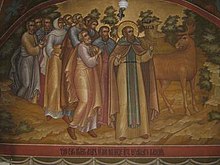1439
Appearance
(Redirected from AD 1439)
This article needs additional citations for verification. (May 2019) |
| Millennium: | 2nd millennium |
|---|---|
| Centuries: | |
| Decades: | |
| Years: |
| 1439 by topic |
|---|
| Arts and science |
| Leaders |
| Birth and death categories |
| Births – Deaths |
| Establishments and disestablishments categories |
| Establishments – Disestablishments |
| Art and literature |
| 1439 in poetry |
| Gregorian calendar | 1439 MCDXXXIX |
| Ab urbe condita | 2192 |
| Armenian calendar | 888 ԹՎ ՊՁԸ |
| Assyrian calendar | 6189 |
| Balinese saka calendar | 1360–1361 |
| Bengali calendar | 845–846 |
| Berber calendar | 2389 |
| English Regnal year | 17 Hen. 6 – 18 Hen. 6 |
| Buddhist calendar | 1983 |
| Burmese calendar | 801 |
| Byzantine calendar | 6947–6948 |
| Chinese calendar | 戊午年 (Earth Horse) 4136 or 3929 — to — 己未年 (Earth Goat) 4137 or 3930 |
| Coptic calendar | 1155–1156 |
| Discordian calendar | 2605 |
| Ethiopian calendar | 1431–1432 |
| Hebrew calendar | 5199–5200 |
| Hindu calendars | |
| - Vikram Samvat | 1495–1496 |
| - Shaka Samvat | 1360–1361 |
| - Kali Yuga | 4539–4540 |
| Holocene calendar | 11439 |
| Igbo calendar | 439–440 |
| Iranian calendar | 817–818 |
| Islamic calendar | 842–843 |
| Japanese calendar | Eikyō 11 (永享11年) |
| Javanese calendar | 1354–1355 |
| Julian calendar | 1439 MCDXXXIX |
| Korean calendar | 3772 |
| Minguo calendar | 473 before ROC 民前473年 |
| Nanakshahi calendar | −29 |
| Thai solar calendar | 1981–1982 |
| Tibetan calendar | 阳土马年 (male Earth-Horse) 1565 or 1184 or 412 — to — 阴土羊年 (female Earth-Goat) 1566 or 1185 or 413 |

Year 1439 (MCDXXXIX) was a common year starting on Thursday of the Julian calendar.
Events
[edit]January–December
[edit]- May 4 – Battle of Grotnik: Władysław III's royal army defeats the Hussite movement in Poland.
- June 29 – Date of Venerable Macarius' Miracle of the Moose, according to Russian hagiographers.
- July 6 – Pope Eugene IV issues the Bull of Union with the Greeks, proclaiming the end of the East–West Schism. The bull is repudiated by most Eastern bishops shortly thereafter.
- September 8 – Cardinal Giovanni Vitelleschi captures Foligno, ending Trinci's signoria.
- September 29 or October 1 – Eric of Pomerania, King of Sweden, Denmark and Norway, is declared deposed in Sweden. Karl Knutsson Bonde continues to serve as Regent of Sweden.
- November 12 – In England, Plymouth becomes the first town incorporated by the English Parliament.
Date unknown
[edit]- Johannes Gutenberg develops printing with movable type at Mainz at about this date.
- The Great Ordinance is adopted by the French Estates-General. This measure grants the king the exclusive right to raise troops, and establishes the taxation measure known as the taille, in support of a standing army.
- The Council of Florence is moved to Florence.
- At the Portuguese Cortes, Peter, Duke of Coimbra is appointed Regent of the Kingdom.
Births
[edit]- March 3 – Ashikaga Yoshimi, brother of Shōgun Ashikaga Yoshimasa (d. 1491)
- April 3 – Ludwig II, Count of Württemberg-Urach, German noble (d. 1457)
- May 29 – Pope Pius III (d. 1503)
- July 18 – John V, Duke of Saxe-Lauenburg, German duke (d. 1507)
- July 26 – Sigismund, Duke of Bavaria, member of the Wittelsbach dynasty (d. 1501)
- August 10 – Anne of York, Duchess of Exeter, Duchess of York, second child of Richard Plantagenet (d. 1476)[1]
- date unknown – Hua Sui, Chinese inventor and printer (d. 1513)
Deaths
[edit]- April 30 – Richard de Beauchamp, 13th Earl of Warwick, English military leader (b. 1382)[2]
- June 24 – Duke Frederick IV of Austria (b. 1382)
- September 12 – Sidi El Houari, Algerian imam (b. 1350)
- October 20 – Ambrose the Camaldulian, Italian theologian
- October 27 – Albert II of Germany, Holy Roman Emperor (b. 1397)[3]
- December 30 – Margaret Holland, English noblewoman (b. 1385)[4]
References
[edit]- ^ Anne Commire (October 8, 1999). Women in World History. Gale. p. 390. ISBN 978-0-7876-4061-3.
- ^ The Archaeological Journal. Longman. 1864. p. 317.
- ^ "Albert II | Holy Roman emperor". Encyclopedia Britannica. Retrieved May 6, 2019.
- ^ Connor, Meriel (2007). "The Political Allegiances of Christ Church Priory 1400-1472: the Evidence of John Stone's Chronicle". Archaeologia Cantiana. 127. Kent Archaeological Society: 388.

